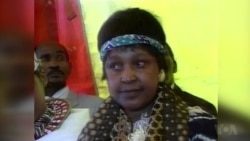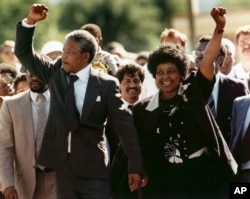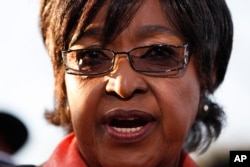Winnie Madikizela-Mandela, a controversial figure who served as a spearhead of South Africa's anti-apartheid movement during husband and future president Nelson Mandela's long imprisonment, died Monday at age 81.
"Mrs. Madikizela-Mandela was one of the greatest icons of the struggle against apartheid," Energy Minister Jeff Radebe said at a news conference at Johannesburg's Netcare Milpark Hospital. She had been hospitalized over the weekend for the flu and had grappled with complications from diabetes for years.
Radebe said she died peacefully, surrounded by family, having "fought valiantly against apartheid state and sacrificed her whole life for the freedom of her country."
"Today we have lost a mother, a grandmother, a friend, a comrade, a leader and an icon," President Cyril Ramaphosa said in a televised address Monday.
He then left to visit the family home later in Soweto. Late in the day there, a VOA correspondent estimated at least 1,000 people had massed to pay respects outside its heavily guarded security gates. The crowd included several hundred journalists, he said.
'Mother of the nation'
As the best-known face in the fight against white rule while Mandela languished in prison for 27 years, Madikizela-Mandela was considered the "mother of the nation." Still serving in Parliament, she was a longtime figure in the African National Congress (ANC), which changed from an insurgent group to South Africa's ruling party after apartheid's end in 1991.
She was admired for her tireless campaign for racial equality, as well as for women's advancement, helping set the stage for Mandela to become South Africa's first black president in 1994. She endured harassment, arrests and several rounds of incarceration for her activism. Arrested in 1969 for alleged terrorism, she spent 18 months in solitary confinement.
Yet she grew into a polarizing figure. Her unrepentant tactics of rebellion grew to clash with her husband's drive for reconciliation, democracy and peace.
Two years after Nelson Mandela's 1990 release from prison, the couple split up after having two daughters together. They divorced in 1996, two years after he became president. He retired in 1999 and died in December 2013.
After the divorce, she appended her family name to her married name and became known as Madikizela-Mandela.
A blemished record
While Madikizela-Mandela maintained her core support among radical black nationalists, her popularity slipped as she refused to show remorse for abductions and murders carried out in her name.
She was charged in the 1989 disappearance and killing of 14-year-old James "Stompie" Moeketsi Seipei, who had been seen at her home in Soweto township and whose body was discovered nearby. He was suspected of being an informant.
She was convicted of kidnapping and of being an accessory to assault in 1991. Sentenced to six years behind bars, she appealed. Her assault conviction was overturned but the kidnapping conviction was upheld, as The Washington Post reported. She was given a suspended sentence but ordered to pay a fine.
Winnie Mandela also came under criticism for expensive tastes, and was further besmirched by allegations of corruption, fraud and theft. She was expelled from her husband's cabinet in 1995.
Committed to a cause
Nomzamo Winifred Zanyiwe Madikizela was born in Eastern Cape province on Sept. 26, 1936, and experienced a political awakening as a young hospital social worker, according to The (United Kingdom) Independent news site.
"I started to realize the abject poverty under which most people were forced to live, the appalling conditions created by the inequalities of the system," it quoted her as saying.
Her passing Monday largely drew remembrances of praise.
Former archbishop Desmond Tutu, a Nobel Peace Prize winner who agitated against apartheid, said, "Her courageous defiance was deeply inspirational to me, and to generations of activists."
"Today I mourn the loss of my dear friend & one of the greatest leaders & activists in the world: Winnie Mandela," tweeted U.S. Representative Maxine Waters. The California Democrat said they collaborated to free Nelson Mandela and end apartheid, and pointed to her as a role model.
Winnie Madikizela-Mandela, who met her future husband at a Soweto bus stop in 1957, once said in a newspaper interview that he had gone soft in prison.
She also said her real marriage was to the African National Congress.
"She will forever remain an encouraging figure in the fight against patriarchy and male chauvinism in and outside politics," said a statement from the ANC Women's League, which she had served as president.
Anti-apartheid activist Peter Jones of Cape Town remembered Madikizela-Mandela from the early 1970s, when he, too, was "a young revolutionary" in the Black Consciousness Movement with Steve Biko.
She worked alongside her husband and other activists but "she played a major role in her own right as a revolutionary by constantly being available for counseling and discussions in an ongoing basis with the leadership" of the ANC, Jones told VOA in a phone interview from his home. "… She has left very deep imprints in the history of the liberation of our country."
VOA Africa Division's Paul Alexander contributed to this report.













